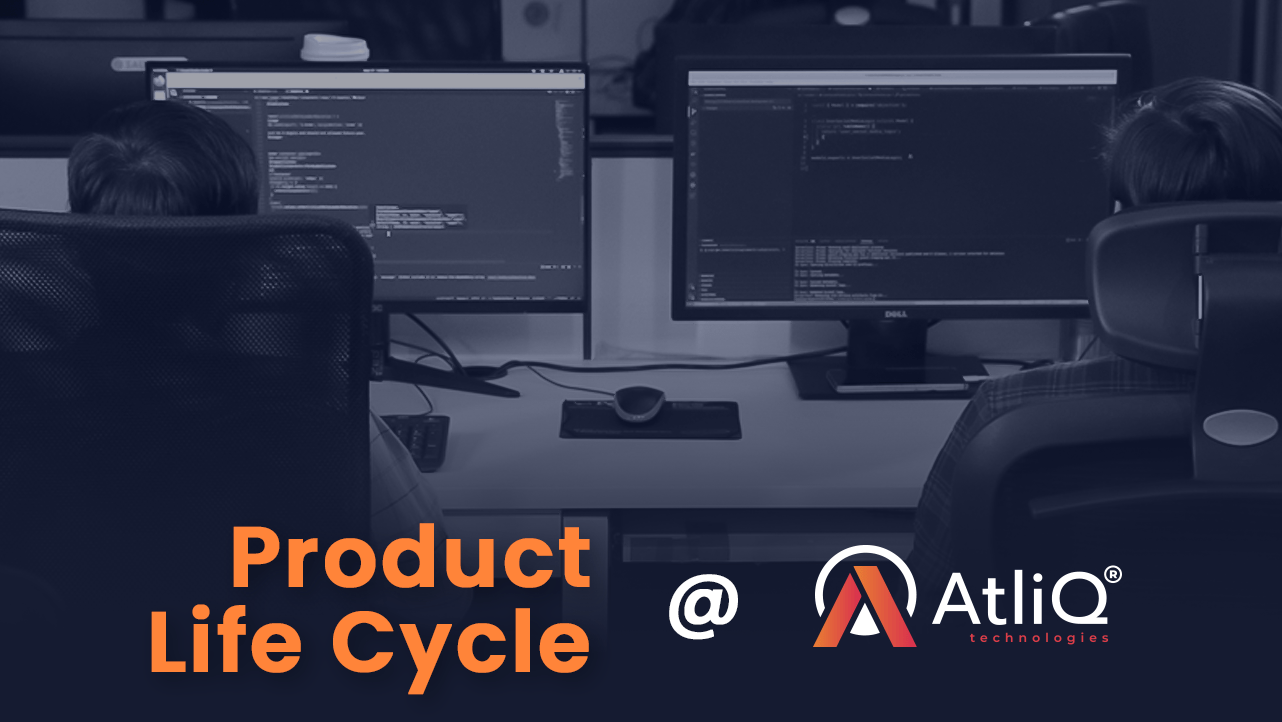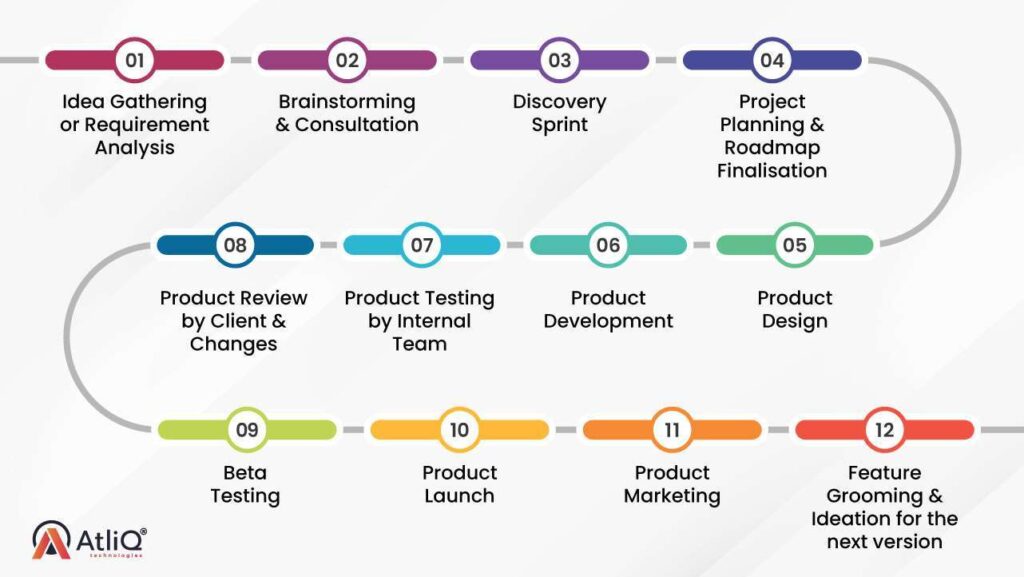
At AtliQ Technologies, the product life cycle is the complete process of taking an idea to reality. Whether it is delivering a new product or updating an existing version, the team works beyond just the development. Our product development life cycle starts right from brainstorming the initial concept to strategically planning, developing the product to releasing it to market and measuring its success.
Our product development lifecycle is far more than how the product is built. Our methodologies include why, what, and whom along with involving cross-functional work from the engineering, management & marketing teams. Our ultimate goal is to build, refine and launch a product that not only you but also your customers love.
Our product managers guide the team to the success of the product, by setting up the strategy, building a roadmap, and defining the features. The cross-functional team works towards planning, building, and delivering the product. This team usually is a combination of representatives from product engineering, programming, UI/UX, and product marketing. Our team is made up of people who will be actively involved in one or more product development stages. They work closely towards the product’s success as well and think about the customer success, sales, profit & branding.
The Product Development Life Cycle at Atliq Technologies is as Follows:
- Idea Gathering or Requirement Analysis: Without a clear goal vision, a team can not really decide on what to build. Thus we start our process with the requirement gathering step. If delivering the project to a client, then the first step is to collect and understand their needs.
- Brainstorming & Consultation: Putting a strategy into action can be tedious especially when plenty of people are involved. It is our primary responsibility to review and re-evaluate the customer’s ideas and determine the priorities. We brainstorm on the ideas which are targeted toward making the product better. We come up with a conclusion by refining the product requirements and features to make the final product more effective. As we aim to bring real value to the business and its customers in a sustainable way, it becomes important for us to combine our intuition and strategies, to set measurable time-bound objectives.
- Discovery Sprint: Discovery Sprint is a period of product discovery. It is designed to understand and tackle the substantial risk and effort to be put into the development. It allows us to evaluate if it is feasible and profitable to carry ahead with the project. The importance of this step is often underestimated, as it provides time for all stakeholders to come together and create a better understanding of the project goals.
- Project Planning & Roadmap Finalisation: By this time, we refine the ideas based on the goals and estimated product value and the available team capacity. In this step, the team defines the major features, milestones, and timeframe needed to build those. The most important part of bringing the project to reality is the calculation by the engineering department who gives the estimation of how much time and resources it will take to complete the project.
- Product Design: Even before a single line of code is written, designs are made available so the client can get a feel of it. Designs are used more towards ensuring clients, engineers, and all other stakeholders are aware of what the end product is gonna look like. It also helps clients and product managers to evaluate the idea better.
- Product Development: This is the step where the actual product development takes place. This step includes Database Design, Architecture, and most importantly Programming (or building) the actual product. The software engineers convert the designs made by the UI/UX team to an actual product.
- Product Testing by Internal Team: Our QA team goes through the project, trying to find bugs and ensuring the product meets the requirements of the client. This is reported back to the engineering team so that they resolve the issues. This enables us to maintain the quality of the product and improve client satisfaction.
- Product Review by Client & Changes: Once the bugs and errors are fixed, we share the project with the client for their reference. Once they are satisfied, we go ahead with launching the product to the general public or beta testers. This step allows us to maintain transparency with the client and thus gives us more clarity in case they have any suggestions/feedback.
- Beta Testing: Beta testing is the phase where the software/ application is a test phase in which a sample audience tries the product. We consider this as a pre-release testing phase, which is also referred to as user acceptance testing. The experience of these users is then shared with the developers who can analyze the same to make final changes or improvise before releasing the product.
- Product Launch: Post the incorporation of changes and feedback from the beta testers and the client, the product is all set to launch. Like a client, the launch day holds high importance to everyone who worked on the product. The product manager coordinates the entire team’s work and also reviews the launch checklist while evaluating if the product is ready to go public.
- Product Marketing: Even though a product launch is important, it is more important to market the same. With 100s of apps and software being launched every day, the right marketing strategy is what will make your product reach its target audience. With our excellent marketing team, we help you outline a tailored promotional strategy. We help you strategize everything right from the marketing channel to the promotional message that needs to be emphasized. We are experts in quality lead generation, digital marketing, and content marketing. We assist you all the way from planning the launch event to all essential tasks and managing your complete promotion to-do list.
- Feature Grooming & Ideation for the Next Version: After the Product is released for the given version, we ideate with the client and come up with the next set of features and roadmap for the next version. The above process is repeated again as ideation, brainstorming & consultation, feature roadmap, design, development, testing, review by client, beta testing, and the launch. This helps the client to have an edge over competitors by adding new features, keeping his/her users engaged, and making sure the product is up-to-date as per the market standards.
Our primary goal is to build a high-level product, within the set time and budget. In this fast-paced volatile business world, it becomes very important for you to gain momentum and win an edge over your competitors. The ultimate secret of our process lies in us working keeping in mind the satisfaction of the end-users. This way we not only help you develop your product but also become a part of your success.
